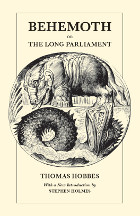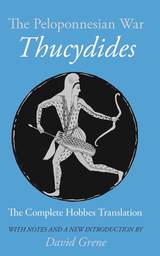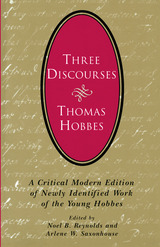4 books by Hobbes, Thomas

Behemoth or The Long Parliament
Thomas Hobbes
University of Chicago Press, 1990
Behemoth, or The Long Parliament is essential to any reader interested in the historical context of the thought of Thomas Hobbes (1588-1679). In De Cive (1642) and Leviathan (1651), the great political philosopher had developed an analytical framework for discussing sedition, rebellion, and the breakdown of authority. Behemoth, completed around 1668 and not published until after Hobbe's death, represents the systematic application of this framework to the English Civil War.
In his insightful and substantial Introduction, Stephen Holmes examines the major themes and implications of Behemoth in Hobbes's system of thought. Holmes notes that a fresh consideration of Behemoth dispels persistent misreadings of Hobbes, including the idea that man is motivated solely by a desire for self-preservation. Behemoth, which is cast as a series of dialogues between a teacher and his pupil, locates the principal cause of the Civil War less in economic interests than in the stubborn irrationality of key actors. It also shows more vividly than any of Hobbe's other works the importance of religion in his theories of human nature and behavior.
In his insightful and substantial Introduction, Stephen Holmes examines the major themes and implications of Behemoth in Hobbes's system of thought. Holmes notes that a fresh consideration of Behemoth dispels persistent misreadings of Hobbes, including the idea that man is motivated solely by a desire for self-preservation. Behemoth, which is cast as a series of dialogues between a teacher and his pupil, locates the principal cause of the Civil War less in economic interests than in the stubborn irrationality of key actors. It also shows more vividly than any of Hobbe's other works the importance of religion in his theories of human nature and behavior.
[more]

A Dialogue between a Philosopher and a Student of the Common Laws of England
Thomas Hobbes
University of Chicago Press, 1997
This little-known late writing of Hobbes reveals an unexplored dimension of his famous doctrine of sovereignty. The essay was first published posthumously in 1681, and from 1840 to 1971 only a generally unreliable edition has been in print. This edition provides the first dependable and easily accessible text of Hobbes's Dialogue. In the Dialogue, Hobbes sets forth his mature reflections of the relation between reason and law, reflections more "liberal" than those found in Leviathan and his other well-known writings. Hobbes proposes a separation of the functions of government in the interest of common sense and humaneness without visibly violating his dictum that the sharing or division of sovereignty is an absurdity. This new edition of the Dialogue is a significant contribution to our understanding of seventeenth-century political philosophy.
"Hobbes students are indebted to Professor Cropsey for this scholarly and accessible edition of Dialogue."—J. Roland Pennock, American Political Science Review
"An invaluable aid to the study of Hobbes."—Review of Metaphysics
"Hobbes students are indebted to Professor Cropsey for this scholarly and accessible edition of Dialogue."—J. Roland Pennock, American Political Science Review
"An invaluable aid to the study of Hobbes."—Review of Metaphysics
[more]

The Peloponnesian War
Thucydides
University of Chicago Press, 1989
"Thomas Hobbes's translation of Thucydides brings together the magisterial prose of one of the greatest writers of the English language and the depth of mind and experience of one of the greatest writers of history in any language. . . . For every reason, the current availability of this great work is a boon."—Joseph Cropsey, University of Chicago
[more]

Three Discourses
A Critical Modern Edition of Newly Identified Work of the Young Hobbes
Thomas Hobbes
University of Chicago Press, 1995
For the first time in three centuries, this book brings back into print three discourses now confirmed to have been written by the young Thomas Hobbes. Their contents may well lead to a resolution of the long-standing controversy surrounding Hobbes's early influences and the subsequent development of his thought. The volume begins with the recent history of the discourses, first published as part of the anonymous seventeenth-century work, Horae Subsecivae. Drawing upon both internal evidence and external confirmation afforded by new statistical "wordprinting" techniques, the editors present a compelling case for Hobbes's authorship.
Saxonhouse and Reynolds present the complete texts of the discourse with full annotations and modernized spellings. These are followed by a lengthy essay analyzing the pieces' significance for Hobbes's intellectual development and modern political thought more generally. The discourses provide the strongest evidence to date for the profound influences of Bacon and Machiavelli on the young Hobbes, and they add a new dimension to the much-debated impact of the scientific method on his thought. The book also contains both introductory and in-depth explanations of statistical "wordprinting."
Saxonhouse and Reynolds present the complete texts of the discourse with full annotations and modernized spellings. These are followed by a lengthy essay analyzing the pieces' significance for Hobbes's intellectual development and modern political thought more generally. The discourses provide the strongest evidence to date for the profound influences of Bacon and Machiavelli on the young Hobbes, and they add a new dimension to the much-debated impact of the scientific method on his thought. The book also contains both introductory and in-depth explanations of statistical "wordprinting."
[more]
READERS
Browse our collection.
PUBLISHERS
See BiblioVault's publisher services.
STUDENT SERVICES
Files for college accessibility offices.
UChicago Accessibility Resources
home | accessibility | search | about | contact us
BiblioVault ® 2001 - 2024
The University of Chicago Press









